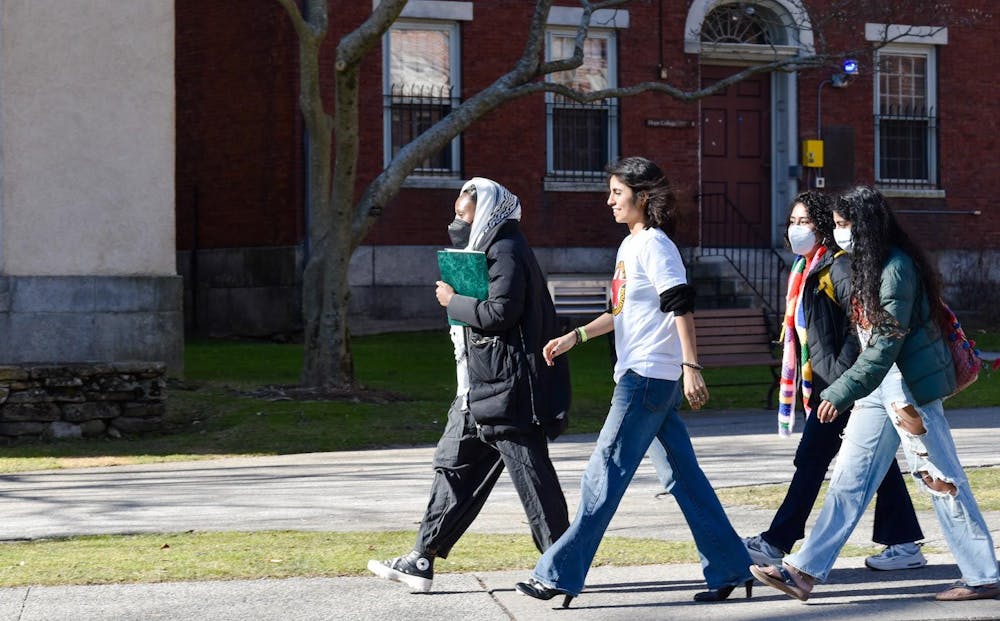Student workers at the Brown Center for Students of Color announced plans to unionize as the Third World Labor Organization Wednesday afternoon.
Organizers delivered a letter requesting voluntary recognition to the office of President Christina Paxson P’19 P’MD’20 during a Labor for Palestine rally hosted by the Graduate Labor Organization.
A 73% supermajority of the BCSC’s roughly 50 student workers voted in favor of forming TWLO, organizers said at the rally.
“With a group of students in roles at the Brown Center for Students of Color having notified the University of plans to seek unionization, we will review their request, determine the best next steps and respond directly to the student organizers,” University Spokesperson Brian Clark wrote in an email to The Herald.
The BCSC “serves as a gathering place for communities of color,” according to the Center’s website. It employs five professional staff and runs Brown’s Third World Transition Program, minority peer counseling program and hosts regular programming. The BCSC did not respond to requests for comment at press time.
In a post shared by the group on Instagram explaining their motivations for forming the union, they expressed intentions to “protect the Center from censorship,” protect freedom of expression, “ensure Brown values the work of students of color” and “uphold the political legacy of the Third World Center.”
“We want to make sure that in our jobs, we have security and safety in voicing our political opinions, but also are paid adequately and have a say in our working conditions,” said TWLO organizer Jo Ouyang ’26, a BCSC minority peer counselor, in an interview with The Herald.
Student employees fill a range of roles at the BCSC, working as Minority Peer Counselors and Coordinators, Heritage Series Programmers, Student Initiative Coordinators, Media Specialists and Front Desk Assistants, according to the letter.
If recognized by the University, TWLO will become the fifth student labor organization to form on campus since 2018, joining the Teaching Assistant Labor Organization, Graduate Labor Organization, Labor Organization of Community Coordinators and the Brown University Postdoc Labor Organization.
If TWLO fails to secure voluntary recognition from the University, organizers wrote that they will ask the National Labor Relations Board to facilitate an election. TWLO must win votes from a majority of BCSC student workers to require recognition, according to NLRB rules. But organizers argue that an election would cause unnecessary delays to “a process that could instead be a productive relationship between BCSC student-employees and the University,” according to the letter.
At the rally, student organizers cited the “depoliticization” of the BCSC and alleged censorship of student workers’ programming as reasons for forming TWLO.
TWLO student organizers also invoked the history of the Center’s founding as a response to student protests at the rally, citing it as a roadmap for the labor organization’s path forward. The BCSC opened as the Third World Center in the ’70s after a series of protests in which students called for an increase in the proportion of incoming Black students and an increase in financial aid for students of color, according to the Center’s website. Organizers characterized the Center as a hotbed for student activism since then.
In 2014, the Center’s strategic planning committee recommended that the Center adopt a new mission statement and change its name from the Third World to the Brown Center for Students of Color.
“We’ve been noticing the Center for Students of Color hasn’t been as vocal in supporting students and students’ activism,” Ouyang said. According to the Center’s website, “The BCSC makes concerted efforts to engage the Center's legacy of activism.”
At the rally, organizers also said that they feel “exploited” and demanded fair compensation for the Center’s student employees.
“Brown uses the BCSC to project its Diversity, Equity and Inclusion claims, but it doesn’t support its student works enough to pay them adequately and fairly,” Ouyang told The Herald.
In addition to improving working conditions and wages for BCSC employees, Gabi Venegas-Ramirez ’26 said that TWLO aims to secure a “legal safety net” that protects students and the Center’s professional staff from retaliation relating to their political advocacy.

Owen Dahlkamp is the managing editor of newsroom on The Herald's 135th Editorial Board, overseeing the paper's news operations. Hailing from San Diego, CA, he is concentrating in Political Science and Cognitive Neuroscience with an interest in data analytics. In his free time, you can find him making spreadsheets at Coffee Exchange.
Ethan Schenker is a university news editor covering staff and student labor. He is from Bethesda, MD, and plans to study International and Public Affairs and Economics. In his free time, he enjoys playing piano and clicking on New York Times notifications.





